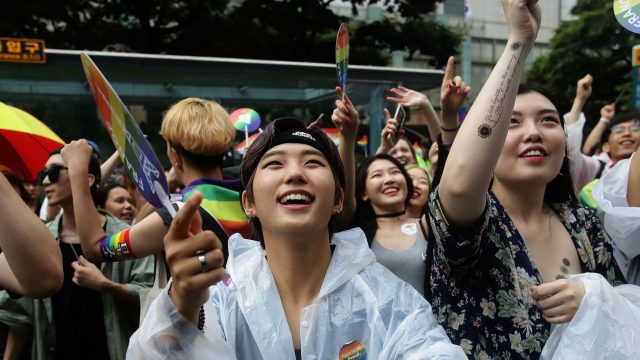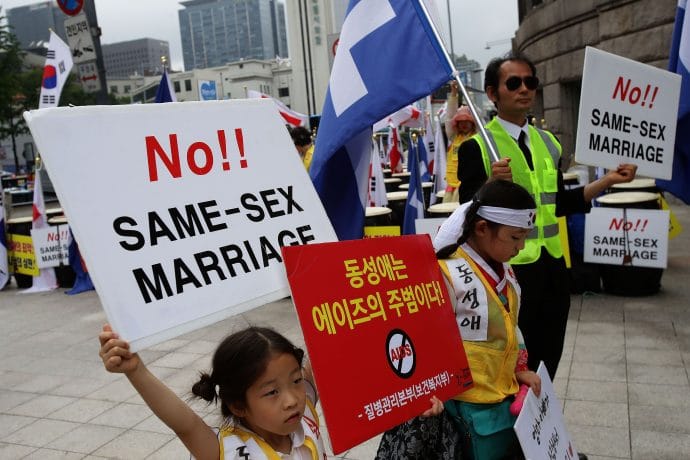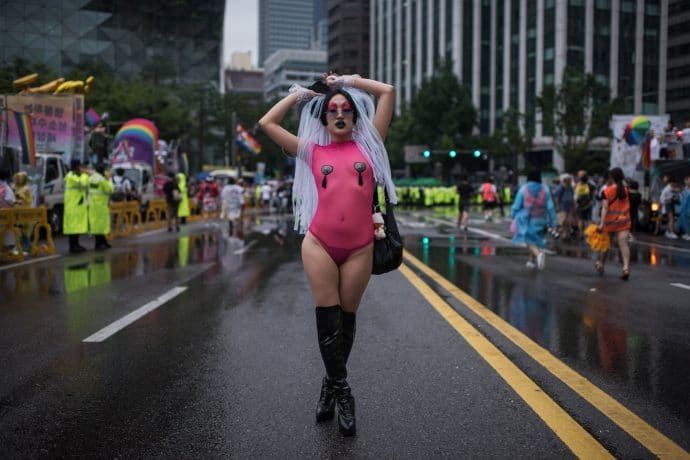
With the Winter Olympics around the corner, the global spotlight is on Korea.
In just a few days, hundreds of athletes will descend on Pyeongchang, South Korea, for the 2018 Winter Olympics, including a number of gay and lesbian Olympians.
But what’s the state of LGBT equality in South Korea?
Historically, the country’s conservative government and large Christian population has meant slow progress: In 2013, a Pew Research poll indicated almost 60% of Koreans believed society shouldn’t accept homosexuality.
There have never been laws against same-sex activity in Korea, and the ages of consent are equal for heterosexual and homosexual sex. But being gay is still culturally taboo: A majority of queer people are still closeted, and those who come out are often encouraged to undergo conversion therapy.
“Most Koreans still keep their sexuality private,” notes Sabrina Constance Hill, a Canadian trans woman who’s lived in South Korea for nearly 13 years. “While many young people will come out to friends, a lot still hide it from their family.”
Like the rest of Asia, South Korea lacks marriage equality, and same-sex unions aren’t recognized by the government, either. Save for a few municipalities, there are no legal protections against discrimination. LGBT Koreans can’t adopt children or openly serve in the military. (Last year, a soldier was sentenced to six months in jail for having consensual sex with another soldier.)
Censorship is not uncommon, and the government has been known to block gay dating apps from app stores in Korea. And Christian groups like Seoul’s Anti-Homosexuality Christian Solidarity fuel campaigns touting marriage as strictly between one man and one woman.

“As the social movement for the LGBT community becomes more visible, the movement of disgusting forces is also becoming more intense,” says Candy Yun of the Korean Sexual Minority Culture and Rights Center. “The hate groups in Korea are trying to overthrow our rights and spewing the same tired propaganda that homosexuality is the cause of AIDS.”
The experience for the transgender community isn’t much better: With a few exceptions, trans Koreans can only change their legal gender markers after they’ve undergone surgical transition and sterilization.
But attitudes are changing quickly. Especially among young people in the republic, 60% of whom support marriage equality. “While Korea is still deeply conservative, there is a trend toward equality and openness,” says Hill.
In a televised debate last year, President Moon Jae-in said he opposed homosexuality. But supporters say he was only saving face in front of conservatives. Four months later, an LGBT rights group won a landmark suit allowing it to legally register as a charity. (The Seoul Metropolitan Government, the Ministry of Justice and the National Human Rights Commission had all tried to block it.)

In 2015, organizers of Korea’s annual Pride event, the Queer Culture Festival, had to go to court to overturn a police ban. In 2017, the event saw a record-breaking turnout with 85,000 attendees.
“Every year, [the festival] grows,” Hill says. “Ten years ago, it was attended mostly by those in the LGBT community. But now more allies seem to be showing up.”
Certain neighborhoods in Seoul, like Itaewon and Hongdae, have gay and LGBT-friendly clubs, and Hill says she generally feels safe. “In my time here, some of my biggest allies have been Koreans. Koreans are generally kind people… Once you are in their good graces, they have your back.”
Media representations have expanded, as well: Filmmaker Kim Jho Gwang-soo and actor-politician Hong Seok-cheon are both out celebrities. Harisu is a well-known trans pop singer and actress. Earlier this month, openly gay K-Pop star Holland released “Neverland,” his debut music video.
The clip, which features a same-sex romance and kiss, has garnered more than 4 million views on YouTube.







